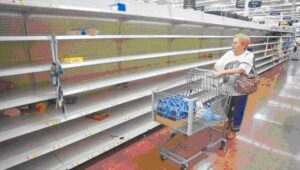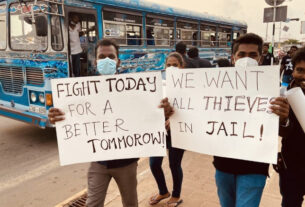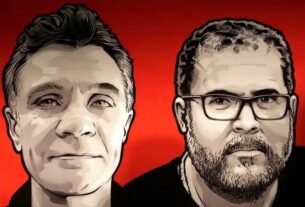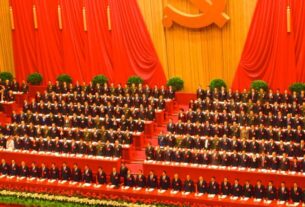Gabriela Sánchez is a member of Socialismo Revolucionario (CWI in Venezuela).
 At the end of October, in a national address to the nation, Maduro announced the discovery of two enormous warehouses of medical goods in Aragua state. While speaking, images were shown of row after row of towering shelves with everything from wheelchairs to needles to medications. Maduro stated there were enough goods to satisfy the needs of the entire public health sector for one year. Two private companies owned by the same people had imported the goods. The dollars they imported with were approved by the government at a preferential rate and amounted to a staggering $236.2 million since 2004 and $24 million this year alone!
Meanwhile, there has been on-going raids in warehouses around the country full of food and other essential goods, such as laundry detergent and nappies to name just a few. In some cases the owners could not legally account for the imported goods (they had no customs stamps, papers etc).
Food scarcity has reached up to 30% this year and inflation is currently at 63.5% officially according to Venezuelan Central Bank (BCV) figures. The scarcity extends not only to food and personal care or cleaning products but also to public hospitals, which often lack essential medical equipment and patients and their families search for supplies such as needles and bandages. Recently paracetamol, which is the main treatment for the symptoms of the recently arrived mosquito borne virus Chinkingunya, either can’t be found in pharmacies or if you are lucky enough to find some they are rationed. Social network sites are even used to sell it- with up to 1000% mark-up on the price.
The Government continues to blame the right wing as part of their on-going sabotage and ’economic war’ together with the re-selling of regulated goods in Venezuela and in Colombia, via smuggling, for the scarcity and inflation.
At the end of October, in a national address to the nation, Maduro announced the discovery of two enormous warehouses of medical goods in Aragua state. While speaking, images were shown of row after row of towering shelves with everything from wheelchairs to needles to medications. Maduro stated there were enough goods to satisfy the needs of the entire public health sector for one year. Two private companies owned by the same people had imported the goods. The dollars they imported with were approved by the government at a preferential rate and amounted to a staggering $236.2 million since 2004 and $24 million this year alone!
Meanwhile, there has been on-going raids in warehouses around the country full of food and other essential goods, such as laundry detergent and nappies to name just a few. In some cases the owners could not legally account for the imported goods (they had no customs stamps, papers etc).
Food scarcity has reached up to 30% this year and inflation is currently at 63.5% officially according to Venezuelan Central Bank (BCV) figures. The scarcity extends not only to food and personal care or cleaning products but also to public hospitals, which often lack essential medical equipment and patients and their families search for supplies such as needles and bandages. Recently paracetamol, which is the main treatment for the symptoms of the recently arrived mosquito borne virus Chinkingunya, either can’t be found in pharmacies or if you are lucky enough to find some they are rationed. Social network sites are even used to sell it- with up to 1000% mark-up on the price.
The Government continues to blame the right wing as part of their on-going sabotage and ’economic war’ together with the re-selling of regulated goods in Venezuela and in Colombia, via smuggling, for the scarcity and inflation.
Who is Sabotaging Who?
Without a doubt responsibility for the situation lies in part with the bourgeois and right wing whom since the death of Chavez, have continued to mount their campaign to destabilize the government. The bourgeoisie, some of who have incidentally jumped at the chance of production and distribution deals at the government’s invitation during the “peace talks”, cry that the scarcity is all related to dollars not made available to them by the government. They state they want to import but due to government inefficiency and bureaucracy they can’t and therefore it is a problem of supply and distribution. It is true that the assignation of dollar for both private and public importations have dropped this year by around a third, but even with this drop over US$17 billion (the annual GDP of some small nations) was assigned in the first six months of 2014! Despite the government increasing its importations in the last 12 months, 60% still remains in the hands of the private sector at their approval. The absence of goods for months on end followed by their sudden reappearance and fear they might not be found again generates an environment of anxiety and uncertainty and promotes nervous bulk buying, accentuating the ’scarcity’. Also without a doubt many regulated goods are bought in bulk before and after they hit the shelves by intermediaries who then resell them at a higher price or hoard them until supply lowers again. The private sector withholds the distribution of goods to put pressure on the government to increase the regulated prices of basic goods, which the government continues to comply with. Pasta, a staple of the Venezuelan diet, was recently increased by 300%. Lorenzo Mendoza, the president of food production and distribution company Polar, dramatically stated in October that there was only enough maize flour (used to make arepas- the most consumed food in the country and a key ingredient in traditional Christmas food hallaca) to last till December and that after this date there would be none unless the government agreed to increase the regulated price. Polar, owned by the oligarch family, produce and distribute foods that account for 18% of the basic Venezuelan diet. Mendoza, one of the wealthiest men in the country, claimed that it was impossible for them to import the maize needed for packaging and distribution at the regulated price. The Government later announced a 218% increase in the price. Now, in November, most supermarkets have a healthy supply of Polar’s maize flour for sale at the new regulated price. When other goods in short supply are released, little by little in different supermarkets, there are enormous queues to buy them and people often go to 3-4 different places to try and find what they need all the while queuing for hours, adding to the day-to-day stress of ordinary Venezuelans. This on-going situation is clearly part of driven campaign to shift traditional bases of support for the government and oust them- either electorally as favoured by the moderate rights or on the street as favoured by the minority reactionary rights. But it is not enough for the government to say that the right wing are responsible for this situation when they are so obviously part of it themselves. The government controls the state petroleum company PDVSA. The export of petroleum and its products via PDVSA generates 95% of the foreign currency that comes into the country, money that is then allocated to the private sector by the Government who also set the exchange rates at which the private sector buys the dollars with their cooperation. Recently the Vice President for Food Security and Sovereignty, Iván Gil, stated that “here [in Venezuela] there is a serious private sector, a sector responsible, that on one hand provides materials that are distributed in the public chains Pdval and Mercal and on the other hand they themselves have decided to come and offer their regulated products at regulated prices” and that “the private sector works all year hand in hand with us [the government], above all in relation to access to raw materials and distribution……”. His comments were made in relation to the recent arrival of goods, including household appliances, toys for children, food not produced in the country and so on, for Christmas into Venezuelan ports. Comments such as these force us to ask exactly who is behind the so-called ’economic war’? One of the enormous contradictions of Chavism is that it speaks of socialism and that Venezuela is socialist but yet maintains capitalism and all the distortions and contradictions it brings. For many years the emergence of counter-revolutionary, reformist and bureaucratic forces within Chavism and the Bolivarian Process have been evident, as has the corruption that exists to varying degrees in every government department. The corruption and complicity extends to the armed forces, whose generals hold key powerful positions in the government and who have declared themselves “Chavistas”. Maduro states that, in additional of the economic war, 40% of all foods in Venezuela are smuggled across the heavily militarized boarder to Colombia. Organized mafias, in conjunction with paramilitaries, smuggle the regulated goods, along with the more traditionally smuggled subsidized petrol, in gigantic quantities brought at the parallel market rate with dollars (around 90% less then the cost in local currency) and reap massive profits. It is blindingly obvious that this operation could not function without the implicit cooperation of sectors of the armed forces and elements within the government itself- particularly in the bordering states of Zulia and Tachira held by the opposition and government respectively. The recent measures introduced by the government to combat these issues are further examples of how the government looks to work within capitalism rather than address and fight against the reasons for the existence of the problems, which is the system itself.The Informal Sector
The new law against the selling of food and basic necessities in the informal sector is evidence of this. 42% of workers in the country are informal and a significant percentage of these workers earn a living as street sellers, known as ’buhoneros’ in Venezuela, selling food, clothing and other goods. In most cases of scarcity in recent history you could still find the most basic necessities, such as sugar, coffee and maize flour, with the buhoneros. However, more recently the prices of these goods in high demand but little supply are sold at 50-100% more than what you would find them in the large supermarket chains where they are sold at the regulated price. From November 1, those who continue to sell the goods will initially be warned against doing so, then have their goods confiscated and given a fine and if they continue to do so they will be forced to appear in court with a maximum penalty of 12 years prison. The government also stated that if they were not born in Venezuela that their Venezuelan nationality could be revoked. This will impact significantly on Colombian and Haitian foreign nationals who make up a sizable percentage of the informal sector. Clearly those being punished are the buhoneros themselves and not the organized mafias who sell the goods to them first before they take them to the street. For every warehouse uncovered there are hundreds, perhaps thousands more hoarding goods in scarce supply and ready to sell them onto the buhoneros at a profit who in turn sell them to make a profit.The Formal Sector
The irony of punishing, or in some cases revoking the Venezuelan nationality of foreign nationals, those at the absolute bottom of the chain should not be lost on working class and poor Venezuelans, who often go to smaller private supermarkets or municipal markets to buy goods. Here enormous mark-ups on prices are often found, but by owners who are “legally” selling them. Sometimes the goods, usually more basic products, are purchased with government-approved dollars, but sold at 50-100% more than the actual price. At other times, such is the case with some small supermarkets or ’delis’ more ’gourmet’ items are bought with dollars purchased on the parallel market and sold at anywhere between 100- 1000% the actual price. Large companies such as Polar faced with regulated prices have developed their own way of justifying higher prices on essential the same goods. New products such as maize flour supposedly with ’rice flour’ are exempt from being regarded as a regulated product. Semi-low fat milk powder is also exempt from the regulated prices and its price is 80% than that of full cream milk powder. In reality those who can pay the price asked, by the buhoneros formal or informal, as might be the case, pay. If in a municipal market or the street you complain or argue about the price you simply won’t be sold it and will go without.Measures
The government measures of supervising and raiding shops and markets to monitor prices and ensure they are being sold according to law has been largely ineffective, except in some large supermarket chains. While hotlines have been set up to denounce over-charging, owners are regularly fined and in some cases prices displayed by order of law, overall it has done little to stop the speculation and inflation. In the last ten years the government’s measures of opening state run supermarkets and increasing public importations initially had a positive impact for the working class and poor. The opening of the Bicentenario Supermarkets meant that most basic products could be found at regulated prices. But the massive demand and the absence of sufficient supermarkets has resulted in an average 5 hours trip to shop taking into account the queue to get in, the time to find your goods, if you’re lucky enough to find everything, and the queue for the checkout. As we have consistently stated, the continual economic reliance on the exportation of petroleum to fund measures and reforms within the confines of capitalism leaves the Bolivarian Process highly vulnerable to international objective factors, such as the recent fall in the price of petroleum. Furthermore the little real support that has been given to national production or to projects to diversify the economy has meant that reliance on the exportation of petroleum for the importation of even basic necessities is higher than ever. The continual bureaucratic control of government institutions, such as Cenoex, which was created as a central control for importations, without participation or democratic control of the working class and the poor, means that corruption and inefficiency continues to run free. The on-going absurdity of the government supplying the parasitic ruling class with billions dollars while the majority of the population, being the working class and poor, continue to struggle to make ends meet must stop. But the only way it, along with all the other contradictions, will stop is through the conscious revolutionary struggle of the working class and the poor organized and armed with a revolutionary program for socialism.We call for:
- An immediate freezing of prices on all food and goods of necessity.
- The stamping of prices on all food, medical and other goods of basic necessity.
- An audit, carried out by the organs of popular power (the community councils, the communes etc), of all private companies that have received dollars from the government. That they be held to account for every dollar they’ve received. End the corruption that continues to impoverish the working class and poor.
- Implementation of progressive taxation and tax on luxury items. For an end to IVA (goods and sales tax) on foods and medicines.
- All power and independence to the community councils and communes (organs of popular power), without bureaucratic interference, to organize and monitor the distribution and sale of foods and other necessities in their community.
- For a planned economy organized by the committees of popular power where the real needs of society, and not the needs of the parasitic capitalist class, can be addressed. Such a plan must be developed under a perspective of sustainable growth and conservation of the environment.
- Nationalization, under the democratic control of workers, of all importations and exportations of trade nationally and internationally, to end speculation and the flight of capital. This measure has been partially adopted by the government recently with the creation of Cencoex, but this institute continues to be controlled by the bureaucracy without any type of control or participation from below.
- Nationalization of the commanding heights of the economy- not one more cent to the ruling class!



